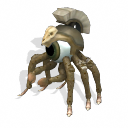The fish pepper (named for its common use in seafood dishes) is popular today, but it nearly disappeared altogether: that it still exists is thanks to William Woys Weaver, a Maryland author and ethnographer. In 1995, Weaver discovered a jar of seeds in the bottom of a freezer that belonged to his grandfather, H Ralph Weaver. Back in the 1940s, African American folk artist Horace Pippin gifted the fish pepper seeds to H Ralph Weaver after getting treated by him for arthritis using honeybee stings from a hive belonging to the family.
Decades later, when William found the jar of seeds, he handed them over to the Seed Savers Exchange, a non-profit that catalogues and preserves heirloom varieties. The Exchange regenerated the seeds and began cultivating them before offering them to the public. They first sold in Maryland and the surrounding Mid-Atlantic region before becoming popular elsewhere.
Oh good grief, don’t tell my parents. It’s already nearly impossible to get them to throw anything away; if they knew there was a fraction of a chance that their hoarding would prevent extinction of something, it would be absolutely impossible.
Though this is pretty cool if you’re not from a hoarder family. 😂
I will apply this thinking to my data hoarding. Some day, the world might thank me for saving some particular file that by then is long gone from the internet! I’m actually doing the world a favor!
That’s why I pirated Bloodsucking pharaohs in Pittsburgh. That movie can’t go extinct just because it’s terrible and nobody wants to watch it!
!bmoviebonanza@lemmy.world is leaking
That’s an automatic subscribe for me.
Yo! Can’t just hog all the copium for yourself!
It’s interesting to consider how many distinctive breeds of plant just vanish.
One time when I was making hot sauce my mother started reminiscing about her grandmother would soak some tiny peppers in vinegar to make hotsauce. From the sounds of things it was some variety of tabasco pepper. But she had been growing and selecting these peppers for multiple decades and so they had probably grown into a distinct variety… and then she died and the variety was lost.
Ultimately they were created by humans via selective propagation and died out because people stopped growing them. They don’t exist in nature so it’s hard to recover them.
Off to Svalbard with you!
It would be hard to resurrect them from fifty year-old seeds.
But it would be easy to resurrect them from fifty-year-old seeds.English really has the worst compound word rules of any Germanic language, if you can really call them “rules”.
more what you’d call ‘guidelines’ than actual rules
True for both the pirates code and the English language.
freedom ain’t free
I’m not bad at cleaning out my fridge, I’m just preserving species for the future!
Thumbnail reminds me of the cover to the Can album “Ege Bamyasi.”








